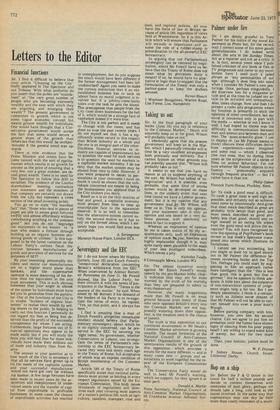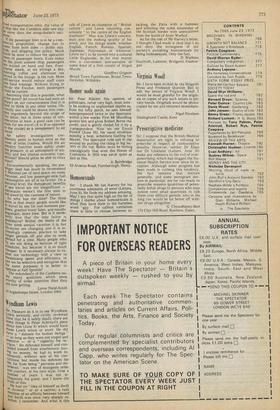Hop on a ship
Sir: Before the P & 0 throw in the towel for half a million pounds and decide to content themselves with memories of past glory, perhaps we should take a long, cool look at the issues involved. In the same way that expressways may one day be little more than costly reminders of a short' lived transportation ethic, the value of !ship like the Canberra may one day more than the scrap-dealer's estiMate.
lithe passenger liner is to be a cornfnercial proposition, change has to !tape from both sides — public attitude, and shipping line policy. Much could be done to reduce the operation costs of passenger liners. Even today tin the most austere ship, passengers are waited on hand and foot. Fourcourse meals, at six sittings a day. %ming coffee and afternoon tea served in the lounge, is the rule. More self-service would reduce staff costs and food wastage. Without trying to out-do the Exodus, more passengers could be carried.
Assuming that this is possible, what Is the point? Jet travel has had such an lirinPact on our consciousness that.it is ard to think in any other terms. Oblously one could be drawn into cornarguments beyond the scope of is letter, but in three areas of consideration at least, a good case can be ade for sea-travel (A to B as opposed to the cruise) as a complement to air travel.
• Air safety investigations conustently point to human error as the ialsse of most crashes. Would the air 'Industry function more safely under be,.°,s pressure, in an atmosphere of staulty and less intense economic cornvolition? Should pilots be able to relax More?
Environmentally speaking, the pasetager liner has much to recommend !t. Minimal use of land space, no noisy Intrusion, and low passenger-mile fuel consumption are all in its favour. On a Personal level, the therapeutic benefits °I sea travel are not insignificant — astronauts weren't the first men to feel awed by the vastness of nature. So who has the time? The third P,oint is that many people would like '0 travel by sea for non-business purPoses, granted lower fares, and eauallv IMPortant, more time. But is it neces:arily true that the time factor is Prohibitive? Within ,the limits of the t,Pree week annual 'vacation it is, but
re-styles are changing and it is in
c,reasingly common practice to take 'Mager periods off and also to work !broad for a time. Many people who IlY are not doing so because of tight schedules, but because it is so much cheaper. Is it necessary always to exploit our technology with a view to Maximising speed and efficiency, or we be selective and recognise that Or some purposes it is. better to °Perate at half tVottle? The redundancy of the Canberra rai,,.ses many questions which seem ""orthy of wider attention than they are now getting.
Lorne Nield-Stnith
'41 loglethorpe Street, London SWG



































 Previous page
Previous page